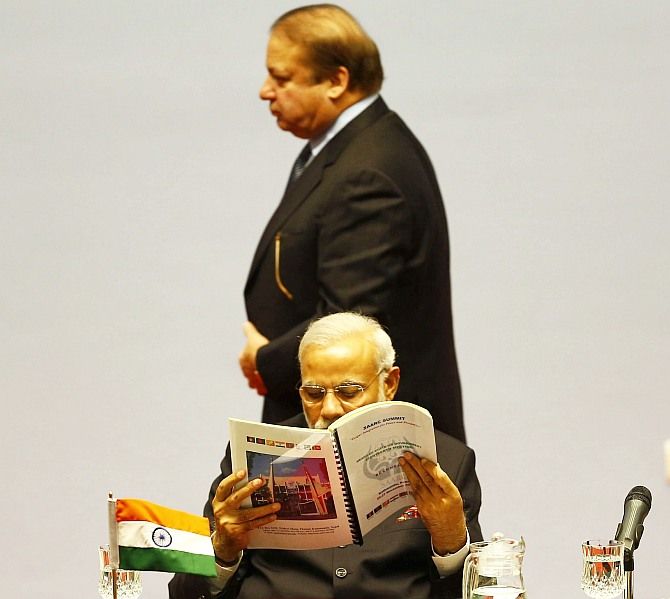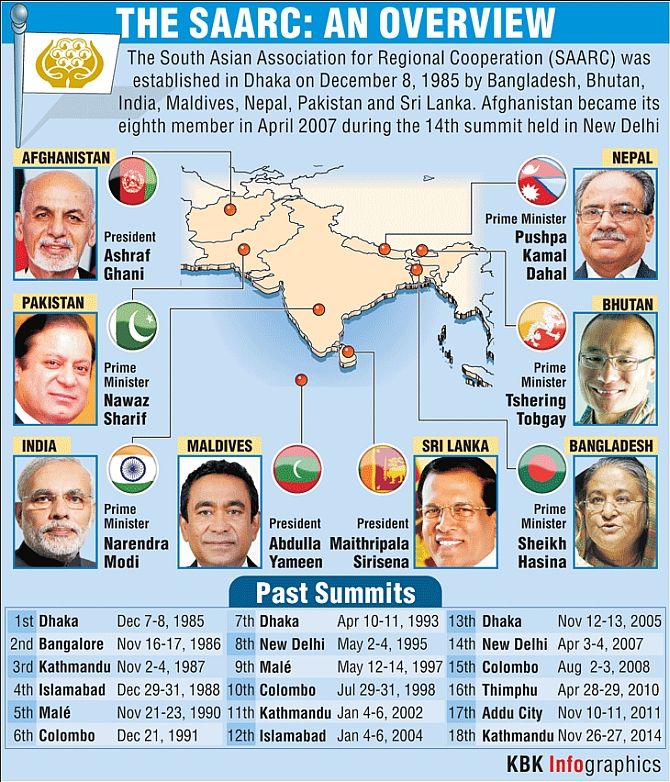The development comes after four of the eight member states -- India, Afghanistan, Bhutan and Bangladesh -- decided to pull out.

In the first concrete fallout of the increasing tensions between India and Pakistan in the wake of the September 18, Uri terror attack, the 19th SAARC Summit, scheduled to be hosted in Islamabad in November, is all set to be postponed.
Nepal, the current chair of the South Asian Association for Regional Cooperation (SAARC), is mulling recommending either a change in venue to salvage the summit or a postponement of the summit after four of the eight member states -- India, Afghanistan, Bhutan and Bangladesh -- decided to pull out.
An official announcement to confirm the postponement is likely in the days to come. The SAARC charter states that the conference will be postponed should any member state decline to participate.
According to a report by Pakistan’s Geo TV, Sartaj Aziz, the advisor on foreign affairs to the Pakistan prime minister, said that the SAARC secretariat has not yet informed officially about postponement of the conference. He, however, said chances are that SAARC Summit will be postponed.
Aziz, according to the report, said that whenever the conference takes place, it will be held in Pakistan. He said it was not the first time India is not attending the regional summit and that it had earlier also caused the summit to be postponed four times.
The summit was scheduled for November 9 and 10. The cancelling of the summit comes in the wake of bitter relations between India and Pakistan, which are likely to further nosedive if India decides to scrap its 20-year-old unilateral decision of granting the ‘Most Favoured Nation’ status to its neighbour.
Prime Minister Narendra Modi is set to chair a meeting on Thursday to discuss the same. On Tuesday, India, Bangladesh, Afghanistan and Bhutan conveyed to Nepal their inability to attend the Summit in Islamabad in “prevailing circumstances.” While India’s ministry of external affairs made public its intent to boycott the Islamabad summit on Tuesday, the other three member states confirmed on Wednesday that they will not participate in the summit.
Apart from Pakistan, the remaining three member states -- the Maldives, Sri Lanka and Nepal -- haven’t taken any decision to not attend the Summit.

The SAARC held its first summit meeting in Dhaka in 1985. There have been instances in the past of the summit being postponed or its venue shifted, but its unprecedented for as many four members to have pulled out.
In their communications to the SAARC chair, the four who have pulled out didn’t refer to Pakistan by name but said the growing interference in their internal affairs by one country has created an environment which is not conducive to the successful hosting of the 19th SAARC summit in Islamabad.
In New Delhi, government sources pointed that the SAARC charter mandates member states to not interfere in the internal affairs of other members. Article 1 of the SAARC Charter demands from member states to respect principles of sovereign equality, territorial integrity, national independence, non-use of force and non-interference in the internal affairs of other states and peaceful settlement of all disputes.
In its communication, Bangladesh said: “The growing interference in the internal affairs of Bangladesh by one country has created an environment which is not conducive to the successful hosting of the 19th SAARC summit in Islamabad.” Dhaka said it believes regional cooperation can “only go forward in a more congenial atmosphere.”
Bhutan blamed the “recent escalation of terrorism in the region” to have “seriously compromised the environment” for the holding of the summit. It said that it shared the concerns of some of the member countries on the deterioration of regional peace and security due to terrorism.
Afghanistan said: “Due to increased level of violence and fighting as a result of terrorism imposed on Afghanistan”, the President Ashraf Ghani “with his responsibilities as the Commander-in-Chief will be fully engaged, and will not able to attend the summit.”
In Washington, the US asked India and Pakistan to resolve their differences through diplomacy and not through violence. On New Delhi’s decision to not attend the SAARC summit, the White House spokesperson said: “It would benefit the region. We want to see de-escalation in the political discourse between the two countries and greater communication and coordination between them.”
The spokesperson said the US is not going to give a prescription to the two South Asian neighbours on how to deescalate, but that it was in their mutual interest to put aside tensions and establish more normal channels of communication.












 © 2025
© 2025